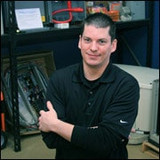Safety Advice for Your Emergency Generator
29th Aug 2018
 If you have ever experienced blackouts, you know how helpful a backup generator can be. The right one could get you and your family through even a lengthy outage. However, even a good, reliable generator could have its dangers if not cared for properly. Follow this safety advice to keep yourself, your family, and your generator safe.
If you have ever experienced blackouts, you know how helpful a backup generator can be. The right one could get you and your family through even a lengthy outage. However, even a good, reliable generator could have its dangers if not cared for properly. Follow this safety advice to keep yourself, your family, and your generator safe.
At a Distance
Carbon monoxide poisoning is one of the more prominent risks of having a generator. You can avoid the problem, and to do so you should keep your generator the right distance from your home’s structure. Make sure you don’t run the generator in an enclosed space, like a garage, or even in a partially enclosed space. Make sure that carbon monoxide cannot get through windows and other openings of your home. Your generator manufacturer and the NFPA have recommended installation distances, so be sure to follow those.
In addition, you should learn the warning signs of carbon monoxide poisoning. One of the most dangerous things about it is that it has no smell or taste; it’s often undetectable. If you, or anyone in your household, has noticeable fatigue, dizziness, headaches, and nausea, you should be concerned about carbon monoxide.
Nearby Help
When your generator needs service, you don’t want to wait long for that service. After all, your generator should be ready for an emergency, and it cannot be ready if you’re waiting for help. So, it’s important that your service company be local. That way, you’re more likely to get immediate service, or close to it. Never risk your generator not being ready when you need it. Your backup generator is one of the best investments you can make to support your home. Keep it at its best; follow safety advice to keep your emergency generator running safely, as it should. When you need the best generator, come to Nationwide Generators.



